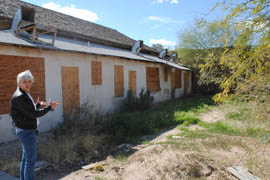[Source: Tri Valley Central.com, Special to the Florence Reminder] – Arizona community leaders have announced the formation of a political committee, Restore the Voters’ Heritage Fund, to seek voter approval of a ballot referendum designed to support the Arizona State Parks Heritage Fund in acquiring and preserving recreational and historical assets across the state. The measure, which would go before the voters in the Nov. 2012 election, is now being considered by the Arizona Legislature.
HCR2047, sponsored by Representative Russ Jones (R-Yuma) and cosponsored by a bipartisan group of 17 members of the House, would place a referendum on the November ballot seeking voter approval for the Arizona State Parks Heritage Fund.
“Pristine areas that represent the varied vistas, flora, and fauna found throughout Arizona, along with many important fragile sites, represent the heart and soul of our state,” Jones said. “It is particularly important now, as Arizona celebrates its Centennial, that we rededicate ourselves to the preservation of our historical roots and spectacular vistas.”
The Arizona State Parks Heritage Fund was initially established in 1990 following the passage of a citizen-approved ballot measure. As a result of the recent recession, however, the Legislature chose to redirect the dollars and remove that Fund from statute in order to close budget gaps.
HCR2047 has already passed its first hurdle, gaining the unanimous 9-0 vote of the House Agriculture and Water Committee.
“In celebration of Arizona’s centennial there is nothing we could do that is more significant than to restore the one major tool our state has for preserving our special places,” said Phoenix lawyer Grady Gammage Jr., chairman of the committee that will seek voter support for the referendum this fall.
Richard H. Dozer, chairman of GenSpring Family Office – Phoenix and former president of the Arizona Diamondbacks, is serving as treasurer of the committee. Looking back, he reflects, “The Heritage Fund has supported parks, trails, open space, jobs, and a better economy for Arizona in the past. We need it fully restored so that it continues that important work of preserving our rich history, beautiful landscapes, and our childrens’ strong minds and bodies. That is why I have agreed to support this campaign.”
One supporter of the restoration effort is Vicki Kilvinger, mayor of Florence. “From 1991 to 2006, Florence received a total of 18 grants totaling $1.5 million dollars, which was matched by the same amount for a total of over $3 million dollars,” said Kilvinger. “Our community and others across the state have been able to rehabilitate historic buildings utilizing the Fund. Passage of the referendum would reestablish a program that would create jobs in this difficult economy and also save historic properties, build parks, and contribute to a higher quality of life for our residents.”
According to Beth Woodin, president of the Arizona Heritage Alliance, a new coalition will support and lead the referendum campaign. “Already thousands of activists who have supported the Arizona State Parks Heritage Fund in years past are ready to hit the ground running. It is expected that many other individuals and organizations will join this important cause for a better Arizona. It is time to restore the voters’ Heritage Fund.”

